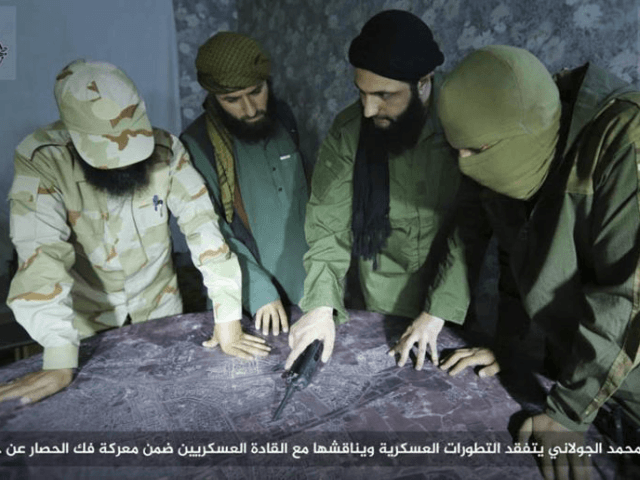Sayyed Hassan Nasrallah, the leader of Hezbollah in Lebanon, on Sunday accused the United States of interfering with the Syrian military’s alleged efforts to defeat the Islamic State once and for all.
“The American air force in some areas prevents the Syrian army and its allies from advancing in areas controlled by Islamic State,” said Nasrallah. “The Americans are working to hinder the battle against Islamic State.”
Reuters notes that Nasrallah’s comments “came after a senior U.S. official said President Donald Trump was considering putting sanctions on Iran for its support of Hezbollah, and as the U.S. Congress prepares to consider tighter sanctions on Hezbollah itself.”
Nasrallah also accused Israel and Saudi Arabia of working with the United States to threaten the stability of the Middle East. He said the Saudis are funding organizations such as the Islamic State, al-Qaeda, and “other organizations in that circle.” By “that circle,” he effectively means Sunni Muslim terrorist organizations. Iran is sponsoring Hezbollah and other Shiite terrorist organizations in a bid to achieve hegemonic power in the region.
The new sanctions against Hezbollah would tighten measures taken two years ago to cut into the organization’s support from Iran. Hezbollah’s revenues approach one billion dollars annually, most of it from Iran, although Russian coordination with the Lebanese terror group has reached disturbing dimensions after both parties fought on behalf of the Assad regime in Syria’s civil war.
“We have got to double down on the money that’s coming in from Iran and coming in from Syria,” urged House Foreign Affairs Committee Chairman Ed Royce (R-CA), who helped draft a bipartisan bill to impose tougher sanctions on Hezbollah.
“I’m a firm believer that we need to do everything we can to isolate Hezbollah—as recruiters, financiers, weapons traffickers and propagandists,” said Rep. Eliot Engel (D-NY), who added he was “pleased to be the lead Democratic sponsor of Chairman Royce’s bill.”
With more weapons and battlefield experience from its expedition to Syria, plus more territory under its control, Hezbollah has grown from an anti-Israel terrorist gang to a “regional power,” as one of its political officials told Middle East Eye on Monday.
“Now, we have fought in urban settings in al-Qusayr, in the mountains in Qalamoun and in the desert in Palmyra, and this has given Hezbollah great military experience. We also fought alongside traditional armies, which has given Hezbollah an ability to develop battle tactics,” the official boasted.
Middle East Eye quotes other Hezbollah sources to the effect that Hezbollah intervened in Syria to protect Shiites from the Islamic State at first, but came to believe it was fighting a defensive war against ISIS and al-Qaeda, which it believes would have invaded Lebanon after toppling Assad. Hezbollah’s recruiting techniques grew aggressive and highly refined during the Syrian intervention, with the estimated 1,300 to 1,500 fighters killed in Syria portrayed with reverence across Lebanon as battlefield martyrs. Nasrallah was speaking at a ceremony to honor Hezbollah fighters killed in Syria when he accused the United States of protecting ISIS.
Fighting ISIS and al-Qaeda in Syria has made Hezbollah more popular with Lebanese Shiites, allowing the terrorist organization to consolidate its political power at home, to the great frustration of Sunni leaders. Nasrallah defiantly insisted on Sunday that his group is so popular in Lebanon that further U.S. sanctions will not loosen its grip on power. “Those who sacrifice their sons for the organization will not be put off by financial issues,” he said.
“They’re betting on a winning horse. Everything Hezbollah has promised, they delivered. If they say something will happen, it does. If they say it won’t, it doesn’t,” Beirut-based communications specialist Hussein Itany told Middle East Eye.
Hezbollah has not forgotten its origins as a “resistance” against Israeli “oppression.” Last week, Nasrallah accused Israel of pushing the Middle East to the brink of war, and warned the Israelis they “do not have a correct picture about what is awaiting them if they go to the idiocy of this war.”
Among other perils, Hezbollah has threatened to assemble “hundreds of thousands of fighters from across the Arab and Muslim countries” and march this Shiite army through Syria to attack Israel. It has also threatened to strike the Israeli nuclear reactor at Dimona or the chemical plant at Haifa with advanced missiles now in Hezbollah’s possession.
Newsweek noted in September that Hezbollah’s campaign of intimidation includes billboards on the Israel-Lebanon border with photos of Iranian Supreme Leader Ayatollah Ali Khamenei saying, “We are coming!”
Some analysts argue the reality underlying these psychological warfare exercises is that Hezbollah took heavy losses in Syria, made itself an Iranian vassal to a degree not all Lebanese Shiites are comfortable with, and is primarily interested in shoring up its political position at home right now. Others see Hezbollah becoming the greatest immediate threat to Israel, thanks to its now battle-hardened army and improved weapons, which are hidden among a vast sea of human shields in the form of Lebanon’s civilian population. With Iranian help, its Lebanese proxy has become far more dangerous than it was during the last Israeli-Hezbollah conflict in 2006.
Israeli officials have grumbled that the Trump administration underestimated the Hezbollah threat in its zeal to defeat the Islamic State. Some of them think Israel needs to strike Hezbollah now, before it recovers from its exertions in Syria, and the Syrian government regains enough strength to obstruct Israeli air strikes against Hezbollah positions. The Israelis are fortifying their side of the border in explicit anticipation of a future Hezbollah offensive.
As its crusade against ISIS and al-Qaeda in Syria winds down, Hezbollah may want to keep its martyrdom momentum going by getting into a new fight, and Israel is the obvious target. Hezbollah has global ambitions too, as Israeli Prime Minister Benjamin Netanyahu warned during a trip to Latin America in September.

COMMENTS
Please let us know if you're having issues with commenting.